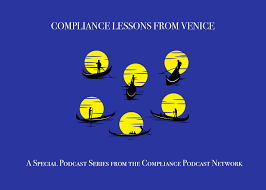What you’ll learn on this podcast episode
The worldwide surge in start-up culture, from venture capital and angel investors to equity structures and fundraising rounds, has transformed business today. But why have so many well-funded start-ups—like FTX and Theranos—imploded in a cloud of scandal? In this episode of the Principled Podcast, host Susan Divers discusses the role of ethics in start-up companies with Tammy Mah-Fraser, an executive director for Alberta Innovates, and Shai Dubey, an assistant professor and distinguished faculty fellow at the Smith School of Business at Queen’s University Ontario. Listen in as the three examine how entrepreneurs, investors, and funders can better integrate ethics and compliance at the beginning of their business endeavors.
Guest: Tammy Mah-Fraser
Tammy Mah-Fraser, DrPH, MSc is the executive director of Health Platforms at Alberta Innovates. As executive director, she tackles system barriers involving multiple organizations for better health outcomes to enable a learning health system and to accelerate commercialization. As a former genetic counselor, she is passionate about incorporating the end-user whether patient, public, or provider early in the process—as well as equipping individuals and companies with tools and training to support their research and product development. She is a project sponsor of several provincial programs—Alberta Clinical Research Consortium and Alberta SPOR SUPPORT Unit—and two ethics programs: A pRoject Ethics Community Consensus Initiative and the Ethics of Innovation Consortium.
Guest: Shai Dubey
Shai Dubey is an adjunct assistant professor and distinguished faculty fellow of business law at the Smith School of Business at Queen’s University. He teaches courses in negotiations, cross-cultural management, ethics, domestic and international business law, and entrepreneurship. He is the academic director for project courses in various MBA programs and the MIB program. Shai has served as the director of the Cornell-Queen’s EMBA program (now EMBAA), the MIB program, the Graduate Diploma in Business program, and the full-time MBA program.
Shai earned his bachelor’s degree from the University of Toronto and his Law Degree from Queen’s University. Shai is also a graduate of the aviation Flight Technology Program at Seneca College. After graduating from Seneca College in 1984, he began his working career as a commercial pilot. In 1985 he founded and ran both an executive aircraft charter company and a flight training school based in Toronto. After selling this company, Shai worked as an aviation consultant providing strategic and regulatory advice to Canadian and foreign clients.
Upon completing law school in 1994, Shai articled and practiced law with two major law firms in Toronto, specializing in corporate commercial law with an emphasis on mergers and acquisitions, corporate finance, and aviation. In 1999, Shai became the Chief Operating Officer, General Counsel, and a member of the Board of Directors of Quicklaw Inc., the leading provider of legal online data base services to the legal profession in Canada. In 2002, upon the sale of Quicklaw to a multinational corporation, Shai returned to the private practice of law. In 2006, Shai joined Smith on a full-time basis.
Host: Susan Divers
Susan Divers is a senior advisor with LRN Corporation. In that capacity, Ms. Divers brings her 30+ years’ accomplishments and experience in the ethics and compliance area to LRN partners and colleagues. This expertise includes building state-of-the-art compliance programs infused with values, designing user-friendly means of engaging and informing employees, fostering an embedded culture of compliance and substantial subject matter expertise in anti-corruption, export controls, sanctions, and other key areas of compliance.
Prior to joining LRN, Mrs. Divers served as AECOM’s Assistant General for Global Ethics & Compliance and Chief Ethics & Compliance Officer. Under her leadership, AECOM’s ethics and compliance program garnered six external awards in recognition of its effectiveness and Mrs. Divers’ thought leadership in the ethics field. In 2011, Mrs. Divers received the AECOM CEO Award of Excellence, which recognized her work in advancing the company’s ethics and compliance program.
Mrs. Divers’ background includes more than thirty years’ experience practicing law in these areas. Before joining AECOM, she worked at SAIC and Lockheed Martin in the international compliance area. Prior to that, she was a partner with the DC office of Sonnenschein, Nath & Rosenthal. She also spent four years in London and is qualified as a Solicitor to the High Court of England and Wales, practicing in the international arena with the law firms of Theodore Goddard & Co. and Herbert Smith & Co. She also served as an attorney in the Office of the Legal Advisor at the Department of State and was a member of the U.S. delegation to the UN working on the first anti-corruption multilateral treaty initiative.
Mrs. Divers is a member of the DC Bar and a graduate of Trinity College, Washington D.C. and of the National Law Center of George Washington University. In 2011, 2012, 2013 and 2014 Ethisphere Magazine listed her as one the “Attorneys Who Matter” in the ethics & compliance area. She is a member of the Advisory Boards of the Rutgers University Center for Ethical Behavior and served as a member of the Board of Directors for the Institute for Practical Training from 2005-2008.
She resides in Northern Virginia and is a frequent speaker, writer and commentator on ethics and compliance topics. Mrs. Divers’ most recent publication is “Balancing Best Practices and Reality in Compliance,” published by Compliance Week in February 2015. In her spare time, she mentors veteran and university students and enjoys outdoor activities.







